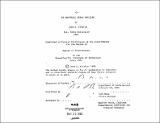| dc.contributor.advisor | Jack Myer. | en_US |
| dc.contributor.author | Winslow, John Arthur | en_US |
| dc.contributor.other | Massachusetts Institute of Technology. Department of Architecture. | en_US |
| dc.date.accessioned | 2013-05-06T17:28:28Z | |
| dc.date.available | 2013-05-06T17:28:28Z | |
| dc.date.copyright | 1980 | en_US |
| dc.date.issued | 1980 | en_US |
| dc.identifier.uri | http://hdl.handle.net/1721.1/78740 | |
| dc.description | Thesis (M. Arch.)--Massachusetts Institute of Technology, Dept. of Architecture, 1980. | en_US |
| dc.description | MICROFICHE COPY AVAILABLE IN ARCHIVES AND ROTCH. | en_US |
| dc.description | Includes bibliographical references. | en_US |
| dc.description.abstract | Adaptability in this Thesis refers to the inherent capacity of a dwelling, to accommodate changing spatial and economic requirements over time. The adaptable dwelling is intended to respond to change as a fundamental condition of the human life-cycle, and offers choices to its inhabitants when changes occur. The adaptable dwelling is intended to provide an alternative to either moving as a result of change or to tolerating a space/need mis-match. Adaptability inevitably requires some overprovision of space and/or services within the dwelling which, in turn, requires increased expenditures. Thus, a major obstacle to providing adaptable housing - quite aside from strictly architectural concerns - is an economic one. A major contention of this Thesis is that adaptability will be realized only when it is built within an economic framework that will support/justify the necessary overprovision of space and/or services. The proposed economic framework in this Thesis is based on the notion of income-generation. The dwelling is conceived as a collection of areas that the inhabitants can combine - and continuously recombine - in a variety of ways such that the inhabitants can rent to others those areas which they do not need for themselves at any given time. In this way, overprovided space and/or services can generate operating income for the inhabitant which can offset the additional expenditures required for adaptability. The architectural intent of this Thesis is to design prototypical adaptable dwellings based on these social and economic notions. The adaptable dwelling is designed to function usefully as a residence for one, two or three families - at the option of the controlling inhabitant. A dwelling conceived and designed in this manner has a significant potential for adaptability within a supportive economic framework. | en_US |
| dc.description.statementofresponsibility | by John A. Winslow. | en_US |
| dc.format.extent | 155 leaves | en_US |
| dc.language.iso | eng | en_US |
| dc.publisher | Massachusetts Institute of Technology | en_US |
| dc.rights | M.I.T. theses are protected by
copyright. They may be viewed from this source for any purpose, but
reproduction or distribution in any format is prohibited without written
permission. See provided URL for inquiries about permission. | en_US |
| dc.rights.uri | http://dspace.mit.edu/handle/1721.1/7582 | en_US |
| dc.subject | Architecture. | en_US |
| dc.subject.lcsh | Dwellings Remodeling for other use | en_US |
| dc.subject.lcsh | Row houses Designs and plans | en_US |
| dc.title | An adaptable urban dwelling | en_US |
| dc.type | Thesis | en_US |
| dc.description.degree | M.Arch. | en_US |
| dc.contributor.department | Massachusetts Institute of Technology. Department of Architecture | |
| dc.identifier.oclc | 07346481 | en_US |
